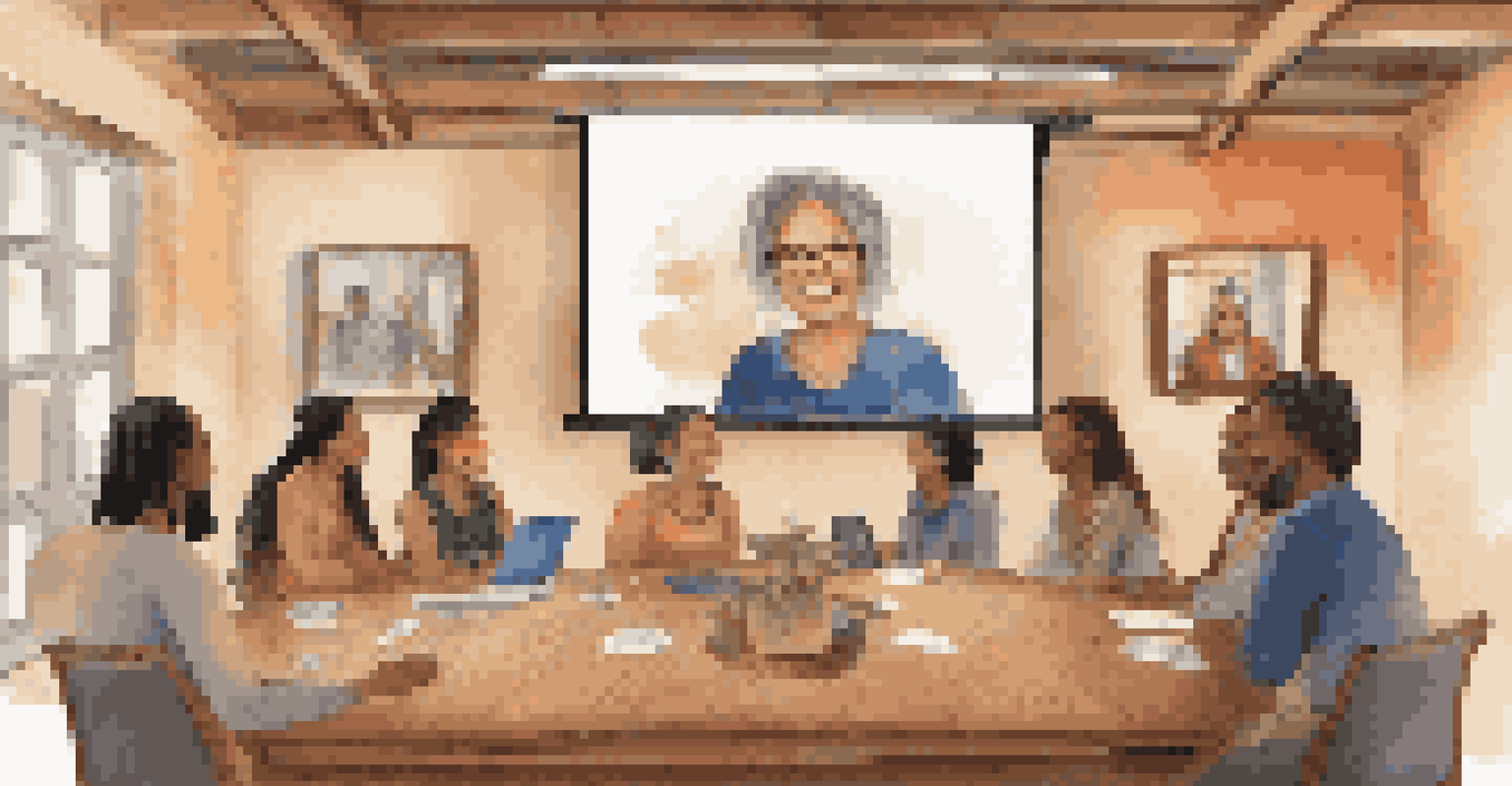Cultural Exchange Programs: Engaging Globally and Locally

What Are Cultural Exchange Programs and Their Purpose?
Cultural exchange programs are initiatives designed to promote understanding and collaboration between different cultures. They provide opportunities for individuals to immerse themselves in new environments, enhancing cross-cultural communication and appreciation. These programs often involve travel, shared activities, and educational components, enriching participants' perspectives on the world.
The exchange of ideas and culture can be one of the most powerful ways to share knowledge and build bridges across communities.
The primary aim of these programs is to break down cultural barriers and stereotypes, allowing participants to experience life from another's viewpoint. By engaging in cultural exchange, individuals can build friendships and networks that extend beyond geographical boundaries. This process fosters a sense of global citizenship, encouraging people to think beyond their immediate surroundings.
Moreover, cultural exchange programs can significantly impact local communities by introducing diverse customs, languages, and ideas. This exchange not only enriches the host community but also allows visiting participants to share their own culture, leading to a reciprocal learning experience. Ultimately, these programs contribute to a more interconnected and empathetic world.
Benefits of Cultural Exchange for Participants
Participants in cultural exchange programs often experience profound personal growth. By stepping outside their comfort zones and engaging with different ways of life, individuals can develop greater adaptability and resilience. The skills gained during such experiences are invaluable, often translating into better interpersonal and professional relationships.

Additionally, these programs enhance participants’ global awareness and cultural sensitivity. Through direct interactions with diverse communities, individuals learn to appreciate the nuances of different cultures, fostering respect and understanding. This cultural competence can be a significant asset in today's globalized job market, making participants more attractive to employers.
Cultural Exchange Builds Global Ties
Cultural exchange programs promote understanding and collaboration, enriching participants' perspectives and fostering a sense of global citizenship.
Beyond professional benefits, cultural exchange programs can also lead to lifelong friendships and connections. Many participants maintain relationships established during their exchanges, creating a global network of friends who share similar experiences. This sense of belonging to a larger community enriches their lives long after the program ends.
How Cultural Exchange Programs Impact Local Communities
Local communities benefit immensely from hosting cultural exchange programs. These initiatives often bring fresh perspectives, ideas, and talents, which can invigorate local culture and economy. For example, international participants may introduce new art forms, culinary styles, or business practices that enhance the community's cultural landscape.
Cultural exchange is not just about sharing your own culture, but also about embracing and learning from the cultures of others.
Moreover, cultural exchange programs encourage local residents to engage with global issues. By interacting with participants from different backgrounds, community members can learn about various social, political, and environmental challenges faced around the world. This awareness can inspire local action and initiatives, bridging global concerns with local solutions.
Community involvement in these programs also fosters a spirit of inclusivity and cooperation. As locals and visitors collaborate on projects, they build mutual respect and understanding, leading to stronger community ties. This collaboration not only enriches the cultural fabric of the area but also encourages ongoing dialogue about diversity and inclusion.
Challenges Faced by Cultural Exchange Programs
Despite their many benefits, cultural exchange programs can encounter several challenges. One significant issue is the potential for cultural misunderstandings or miscommunication, which can lead to tension between participants and host communities. It's essential for program organizers to provide adequate training and preparation to help mitigate these risks.
Another challenge is ensuring equitable access to these programs. Financial constraints can prevent individuals from participating, particularly from underrepresented or low-income backgrounds. Program organizers must develop strategies to provide scholarships or funding opportunities to ensure diversity and inclusivity among participants.
Local Communities Gain Cultural Insights
Hosting cultural exchange programs introduces diverse customs and ideas, positively impacting local culture and encouraging community involvement.
Finally, the impact of global events, such as pandemics, can disrupt or halt exchange programs entirely. This unpredictability highlights the need for flexible planning and alternative solutions, such as virtual exchanges. By adapting to these challenges, cultural exchange programs can continue to thrive and fulfill their mission of fostering understanding.
The Role of Technology in Cultural Exchange Programs
Technology plays a vital role in modern cultural exchange programs, enhancing the way participants connect and engage with each other. Online platforms can facilitate pre-exchange interactions, allowing individuals to establish relationships before meeting in person. This connection often leads to a smoother transition and a more meaningful exchange experience.
Additionally, virtual cultural exchange programs have emerged as a viable alternative during challenging times, such as the COVID-19 pandemic. These online experiences allow participants to share their cultures through digital storytelling, virtual workshops, and live discussions. While not a replacement for in-person exchanges, technology provides valuable opportunities to continue cultural engagement.
Moreover, technology can help program organizers reach a broader audience, promoting inclusivity and diverse participation. By utilizing social media and online marketing, organizations can attract participants from various backgrounds, enriching the exchange experience. In this way, technology not only facilitates connections but also amplifies the impact of cultural exchange programs globally.
Success Stories: Inspiring Examples of Cultural Exchange
There are countless success stories that highlight the transformative power of cultural exchange programs. For instance, a student from a rural area in the U.S. participated in an exchange program in Japan, where they learned about traditional crafts. This experience ignited a passion for art that led to a successful career in design, showcasing how cultural exchange can shape futures.
Another inspiring example comes from a community in South Africa that hosted a group of international volunteers. Together, they worked on a conservation project that not only benefited the local environment but also fostered friendships across continents. The collaborative efforts resulted in ongoing partnerships that continue to support sustainable development in the region.
Technology Enhances Cultural Connections
Modern technology facilitates connections in cultural exchange programs, enabling virtual interactions and broadening participation opportunities.
These stories remind us that the impact of cultural exchange programs extends far beyond individual experiences. They create ripple effects in communities, inspiring others to participate and embrace diversity. By sharing these success stories, we can encourage more people to get involved in cultural exchange initiatives.
How to Get Involved in Cultural Exchange Programs
Getting involved in cultural exchange programs can be an enriching experience, and there are many ways to participate. One of the easiest ways is to research existing programs in your area or online and find one that aligns with your interests and goals. Many organizations offer opportunities for students, professionals, and volunteers, catering to various age groups and backgrounds.
You can also explore local community centers or educational institutions, as they often host cultural exchange initiatives. These programs may include workshops, language exchanges, and cultural events that allow you to connect with others in your community while learning about different cultures. Participating in these activities can be a great way to start your journey of cultural engagement.

Finally, consider creating your own cultural exchange project. Whether it’s organizing a local event, establishing a pen-pal program, or collaborating with international partners, you can contribute to the global dialogue of understanding. By taking the initiative, you can inspire others to join you in celebrating diversity and fostering connections.